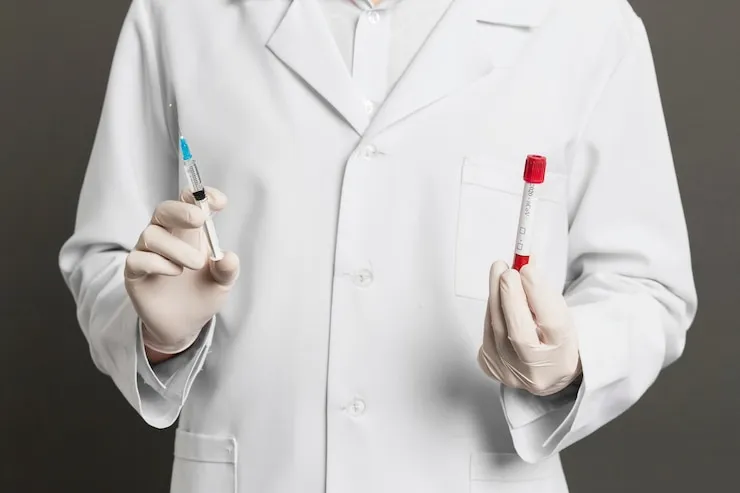Aaron Jackson
STD Testing 101: Get Informed, Get Empowered
STD Lowdown: The No-Shame Guide to Getting Tested
Sexual health is an essential part of overall well-being. Just like regular checkups for your physical health, getting tested for sexually transmitted diseases (STDs) is a crucial aspect of maintaining sexual wellness. While the topic of STDs can sometimes feel shrouded in stigma, knowledge is power. This guide, "STD Testing 101," aims to empower you with clear and concise information about STDs and the testing process.
Ditch the Drama: Understanding STDs and Why Testing Matters
STDs, also known as sexually transmitted infections (STIs), are infections passed from one person to another through sexual contact. These infections can be caused by bacteria, viruses, or parasites. While some STDs may present with noticeable symptoms, many others have no symptoms at all. This lack of symptoms makes routine testing essential for early detection and treatment, preventing complications and protecting your sexual partners.
Here's why regular STD testing matters:
- Early Detection and Treatment: Early diagnosis allows for prompt treatment, minimizing potential health complications and preventing transmission to others.
- Peace of Mind: Knowing your STD status can alleviate anxiety and promote healthy sexual practices.
- Protecting Your Partner(s): Getting tested shows respect for your partner's health and helps maintain a safe sexual relationship.
Your Testing Toolbox: Exploring Different STD Test Options
There are various types of STD tests available, each targeting specific infections. Here's a breakdown of some common test methods:
- Blood Tests: These tests analyze a blood sample for the presence of antibodies or antigens associated with specific STDs.
- Urine Tests: A urine sample is used to detect certain STDs like chlamydia and gonorrhea.
- Swab Tests: Samples collected from the genitals, rectum, or mouth are tested for infections like HPV, chlamydia, and gonorrhea.

The specific test(s) your doctor recommends will depend on your sexual history, risk factors, and any present symptoms.
The Testing Process Demystified: What to Expect During Your Appointment
Getting tested for STDs is a straightforward and confidential process. Here's a general outline of what to expect:
- Consultation: Discuss your sexual history and any concerns you have with your doctor. This helps them determine the appropriate tests for you.
- Testing: Depending on the recommended test(s), a blood sample, urine sample, or swab will be collected. The process is usually quick and painless.
- Results: Depending on the test type, results may be available within a few days or weeks. Your doctor will discuss the results with you and recommend the next steps if necessary.
Here are some additional tips for your appointment:
- Prepare a list of questions for your doctor.
- Be honest about your sexual history. This information helps your doctor provide the most accurate recommendations.
- Relax! The testing process is nothing to be ashamed of.
Beyond the Test: Protecting Yourself and Your Partner
While STD testing is a crucial step, it's equally important to practice safe sex to minimize the risk of contracting or transmitting STDs. Here are some essential practices:
- Condoms: Using condoms consistently and correctly is the most effective way to prevent the spread of many STDs.
- Communication: Open and honest communication with your partner(s) about sexual history and STD testing is essential.
- Limiting Partners: Reducing the number of sexual partners can lower your risk of exposure to STDs.
- Vaccination: Vaccines are available to protect against certain STDs like HPV and Hepatitis B.

No Shame, Just Knowledge: Resources and Support for Your Sexual Wellbeing
Many resources are available if you have concerns about STDs or need support in maintaining sexual health. Here are some helpful starting points:
- Planned Parenthood: Planned Parenthood offers information on STDs, testing, and sexual health in general.
- Centers for Disease Control and Prevention (CDC): The CDC website provides comprehensive information on various STDs, testing, and prevention methods. Centers for Disease Control and Prevention
- Your Local Health Department: Many local health departments offer free or low-cost STD testing services.
Remember, prioritizing your sexual health is a sign of self-care and respect for yourself and your partner(s). Don't hesitate to seek information and get tested! By getting informed and empowered, you can take control of your sexual health and navigate your sexual journey with confidence.

 Telehealth Visits Available
Telehealth Visits Available
